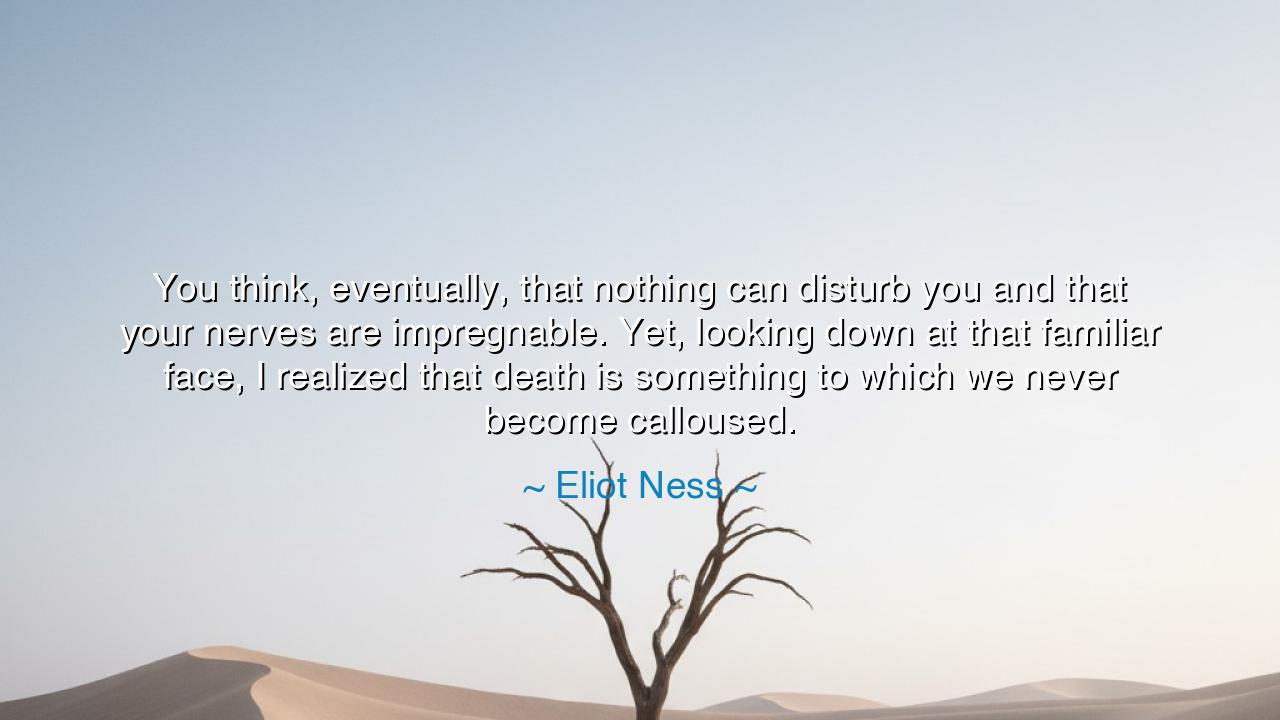
You think, eventually, that nothing can disturb you and that your
You think, eventually, that nothing can disturb you and that your nerves are impregnable. Yet, looking down at that familiar face, I realized that death is something to which we never become calloused.






“You think, eventually, that nothing can disturb you and that your nerves are impregnable. Yet, looking down at that familiar face, I realized that death is something to which we never become calloused.” Thus spoke Eliot Ness, the famed lawman of the Prohibition era, the unyielding leader of “The Untouchables.” His words, drawn not from victory but from grief, carry the weight of one who had seen too much of life’s darkness — and yet, at its core, still found himself pierced by death’s cold truth. In this reflection, Ness reveals a profound paradox of the human spirit: that though we harden ourselves against fear, though we train our hearts to endure the chaos of the world, death remains the one presence that humbles even the strongest of souls.
Throughout his career, Ness lived among danger. He faced the crime-lords of Chicago, the corruption of cities, the endless shadow of violence. Like many who walk long amid peril, he believed — as warriors and guardians often do — that one can grow immune to pain. The soldier in battle, the doctor in the ward, the policeman on the dark street — all come to think that their hearts are steel, that they can look upon tragedy and remain unmoved. But as Ness himself confessed, such armor is an illusion. For when death touches someone known, someone loved, all the layers of toughness fall away, and we stand again as frail beings before the eternal mystery.
The words of Ness echo an ancient truth that even the greatest civilizations have wrestled with. The Romans, hardened by conquest, built temples to Mors, the personification of death, acknowledging that even the mightiest empire could not escape his hand. The Stoics taught that death is natural, to be accepted without fear — yet even they admitted that the loss of one dear to the heart strikes deeper than philosophy can reach. So too with Ness: he speaks not as a philosopher, but as a man confronted by the undeniable tenderness that still lives within him, despite years of facing mortality. His realization is not one of despair, but of awakening — a recognition that feeling pain is proof that we remain human.
History, too, gives us countless mirrors of this truth. Consider Abraham Lincoln, who, amid the blood and fire of civil war, received news of his son Willie’s death. The president who bore the burdens of a nation was seen weeping like any father. In that moment, the leader of armies became simply a man before the mystery of loss. Like Ness, Lincoln learned that no matter how accustomed one becomes to the presence of death, it never loses its sting when it claims one’s own. To grieve is not weakness — it is remembrance that love once lived, and that something eternal has been touched.
And so, Ness’s words are not merely a confession of vulnerability — they are a testament to the indestructibility of compassion. To never become calloused is not a failing; it is a blessing. For the heart that still trembles before death is a heart that still knows how to love. In a world that often praises hardness and detachment, Ness reminds us that there is holiness in feeling deeply, that courage is not the absence of emotion, but the endurance of it. The tear shed for a fallen friend, the silence held beside a body once full of laughter — these are not signs of weakness, but of reverence for the sacredness of life itself.
In truth, death is the great equalizer — the one truth that levels all pride, all pretense. It stands before kings and beggars alike, and teaches them humility. Yet, as Ness discovered, death also reveals what cannot die — the memories, the love, the indelible mark that one soul leaves upon another. To “never become calloused” is to allow these truths to remain alive within us, to carry forward the warmth of what was lost, and to honor the departed not through despair, but through remembrance.
Lesson: Do not strive to become unfeeling in the face of death or suffering. Let your heart ache; let your tears fall. For pain is not the enemy — indifference is. To feel deeply, even when it hurts, is to affirm that life has meaning. Tend to those who grieve; speak kindly of those who are gone; live in such a way that, when your time comes, your memory too will stir hearts that refused to grow cold.
So remember the wisdom of Eliot Ness: no matter how strong you think you are, death will always remind you of your humanity. But this reminder is not to break you — it is to awaken you. To stand before loss and still choose to love, still choose to care, still choose to remember — that is the greatest courage of all. For in that trembling, the soul draws closer to the eternal, and in the face of death, it finds the true meaning of life.






AAdministratorAdministrator
Welcome, honored guests. Please leave a comment, we will respond soon